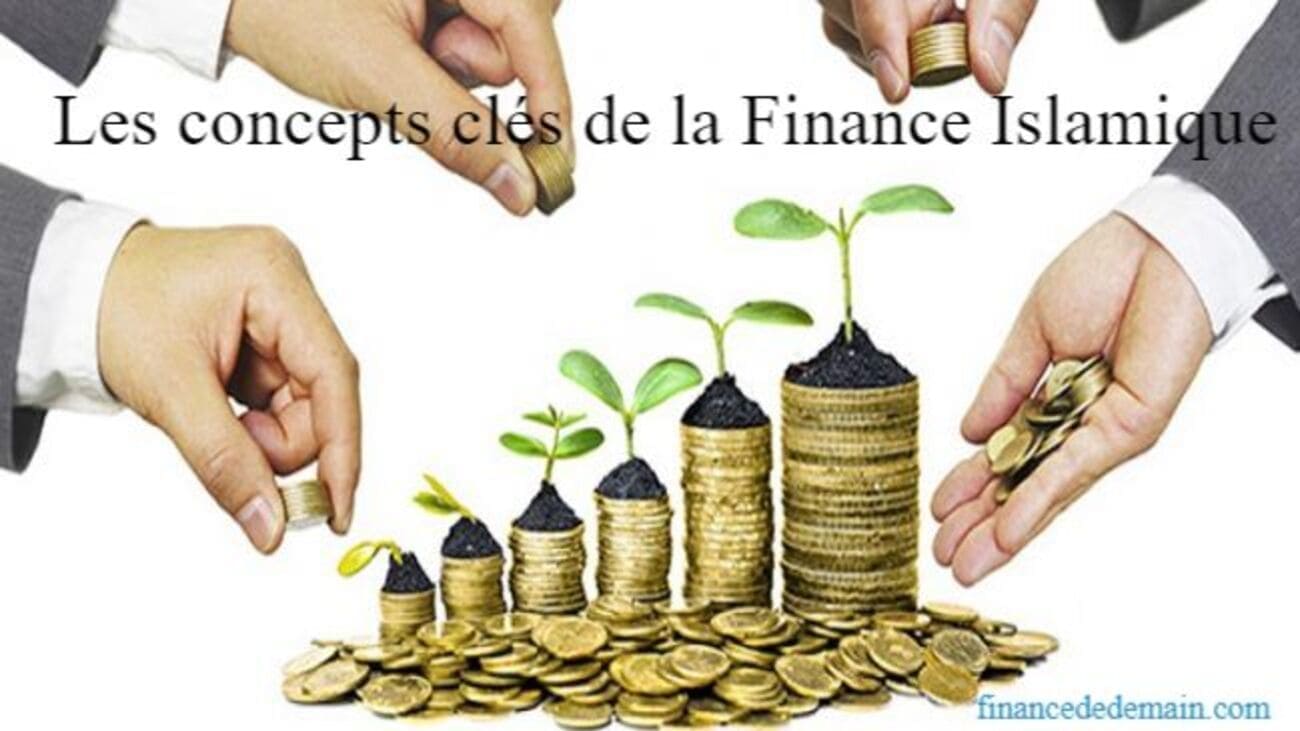The key concepts of Islamic Finance

It is a real pleasure to see you again on this blog. You are always welcome. Today I would like to know if you are a lover of Islamic finance. If yes, you are in the right place; otherwise read until the end. In I present to you the concepts of Islamic finance. These key concepts will allow you to know the BA BA of Islamic finance.
I recommend you read until the end. However, if you want to take control of your personal finances in just 6 weeks, I offer you this hyper-efficient guide. But before you start, here is a training that allows you to earn 1000euros/day on 5euros.com.
The 49 key concepts of Islamic finance
➤ Al-Ajr
It refers to the commission for fees or remuneration charged for services rendered.

Get 200% Bonus after your first deposit. Use this promo code: argent2035
➤ Al Rahn Al
It is an arrangement whereby a valuable asset is placed as collateral for a debt. The warranty may be transferred in the event of a defect.
➤ Al Wadia
It is a resale of goods with a discount on the price initially indicated.
➤ Amana/Amanah
Literally Amana refers to reliability, loyalty, honesty. Technically: an important value of Islamic society in mutual relations.
The term also refers to fiduciary deposits. A person may hold property on behalf of another, sometimes pursuant to a contract.
➤ Bai al Dayn
This is debt financing. That is, the provision of financial resources necessary for production, trade and services in the form of sale/purchase of commercial documents.
The Bai al-Dayn is a short-term facility with a maturity not exceeding one year. Only documents representing debts arising from bona fide commercial transactions may be negotiated.
➤ Bai Al-Arboon/'Arbun
It is a sales contract under which a security deposit is made in advance in partial payment of the price of the raw material purchased. This deposit is retained if the buyer fails to meet his obligations. This contract is similar to a classic call option.
➤ Bai Bithaman Ajil
It is a contract for the sale of goods with deferred payment. The bank purchases the capital goods or goods requested by the customer and then resells them to the customer at an agreed price plus its profit margin.
The customer can pay in installments over a predefined period, or in a single payment. This contract is similar to the Murabaha contract but with deferred payment.
➤ Bai Muajjal (deferred payment contract)
It is a contract providing for the sale of goods with deferred payment. The bank or capital provider buys the goods (assets) on behalf of the company. The bank then sells the goods to the customer at an agreed price plus a profit margin.
The company can settle the full balance at a later date or make installment payments over a predefined period. This contract is similar to the Murabaha contract in that it is also a sale on credit.
➤ Le Bai/Bay'
It is a term that means sale. It is used as a prefix when referring to different modes of Islamic financing. The Bai al-Dayn for example.
➤ Baitul Mal
It is a concept that refers to cash
➤ Sharia
It is the set of texts that govern the life of a Muslim. It is Islamic law taken from the holy text of the Koran and the Sunnah.
➤ Sharia-compliant
It is the characteristic of an operation that is deemed compliant with Shariah.
➤ Shariah Compliance Committee (Sharia Board)
It is a committee of specialists in Islamic law that provides advice to an Islamic financial institution for the development of Sharia-compliant products.
It also ensures that the operations carried out by the bank comply with Sharia law. Moreover, so as not to go beyond the scope of this article, consult our article on the Strengths and Weaknesses of Sharia Control in Islamic Banking.
➤ Koran
It is the sacred text in Islam. It brings together in the form of suras and verses the revelations made by God to the prophet Mohammad through the angel Gabriel for about twenty years (612-632 AD).
For a Muslim believer, the Quran is the light of life. This is why this text is considered the first source of Muslim law
➤ Debt
Dayn is the name of debt in Islamic finance. These debts do not bear interest.
➤ dirham
It is the monetary unit, usually a silver coin, used in the past in several Muslim countries and still legal tender in some of these countries, such as Morocco and the United Arab Emirates.
➤ fatwa
It is an opinion, an opinion expressed by specialists in Islamic law.
➤ fiqh
This is Islamic jurisprudence. It is also called the science of Sharia. It is an important source of the Islamic economy.
➤ Gharar
It refers to uncertainty. This is one of the three fundamental prohibitions in Islamic finance. The Gharar is an uncertain outcome caused by ambiguous terms related to forward exchange contracts.

Get 200% Bonus after your first deposit. Use this official Promo code: argent2035
➤ Hadith
This is the story; historical account of a word, gesture, act, omission, approval of the Prophet Muhammad.
➤ Haram
It is the character of everything that is illegal. Anything that is not lawful is unlawful and therefore haram.
➤ Hawala
Literally this term means bill of exchange, promissory note, check or draft. Technically the debtor transmits the responsibility for the payment of his debt to a third party who is himself his debtor. Responsibility for payment thus lies ultimately with a third party.
Hawala is a mechanism that allows the settlement of international accounts by accounting transfers. It largely removes the need for a physical transfer of cash. It refers to the claim found in traditional finance.
➤ Hawk
This concept refers to the lunar year.
➤ Rent
It is a leasing contract under the terms of which the bank buys an asset for a customer and then leases it for a fixed period.
➤ Ijara-wa-Iqtina
It is similar to the Ijara presented above, with the difference that the customer has the possibility of buying the good at the end of the contract.
➤ Ijma
They are consensuses, unanimous agreements between all the Fiqh scholars of an era. It is one of the four sources of Fiqh.
➤ Exceptional
It is a contract in which the manufacturer agrees to produce and deliver a good or construction at a given price on a given future date.
➤ Jahala ignorance
This term is used when, at the time of conclusion of a sales contract, the price is not known.
➤ Ju'alal
Literally it refers to the price defined for the provision of a service. This term is sometimes used in a technical sense in the Islamic banking model.
➤ kafalah
It is a contract of guarantee by which a third party guarantees the debt of an indebted agent. Responsibility for the debt vis-à-vis the creditor thus rests with the two parties to the contract. As with the Hawala contract, the Kafala does not generate any costs beyond the administrative costs.
➤ Maysir
It is a term that refers to gambling. One of the three fundamental prohibitions in Islamic finance. It is part of the three major prohibitions of Islamic finance alongside Ribâ and Gharar.
The ban on Maysir often serves as the basis for criticism of traditional financial practices such as speculation, traditional insurance and derivatives.
➤ Mudaraba
It is an investment partnership contract between the bank and its client. It is a financing technique used by Islamic banks in which the capital is fully provided by the bank while the other party manages the project.
Profits are shared according to a pre-determined distribution key and any losses are borne by the investor.
➤ Mudarib
In a contract, the person or party who acts as a contractor is called Mudarib.
➤ Muqayada
It is a contract of exchange of a quantity x of a raw material against a quantity y of another raw material not including any exchange of money. The quantities are fixed on the basis of the market prices of the commodities traded.
➤ murabaha
It is a financing contract signed between the bank and its client. It is a form of credit that allows the customer to make a purchase without having to take out an interest-bearing loan. The bank buys a good and then sells it to the customer on a deferred basis.
➤ Musawama
It can be defined as a classic sales contract in which the buyer does not know the profit margin applied by the seller.
➤ Musharaka
It is a financing partner somewhat similar to the Moudharaba in which the profit sharing conditions are predefined and the losses are proportional to the amount invested. It is a form of investment capital.
➤ Nissab
It is the tax threshold from which an individual pays Zakat. It is the equivalent of 85 grams of gold or an estimated wealth of around 1500 euros. The Zakat tax rate is 2,54%.
➤ Qard Hasan
These are Benevolent Loans, without interest or profit. It is more like assistance than trade credit. This technique is rarely used by commercial establishments.
On the other hand, it can be used in specific situations (in the event of difficulties of an individual or a company, or when one wishes to promote the development of emerging sectors).
➤ Rab Al Maal
Unlike the Mudarib in a mudaraba (entrepreneur) contract, the Rab-al-maal is the person who invests the capital.
➤ Rahn
It is a contract by which an agent insures a debt via a collateral (pledge). This type of contract aims to mitigate the counterparty risk borne by the creditor. The advantage of this contract is that it allows the agent to present an asset in his possession as collateral while retaining his use and ownership.
➤ Riba
This is the biggest prohibition in Islamic finance. It is one of the three fundamental prohibitions in Islamic finance alongside Gharar and Maysir. Literally it means illicit increase or addition.
Technically, any increase or advantage obtained by the lender and constituting a condition of the loan. Any risk-free or “guaranteed” rate of return on a loan or investment is Ribâ.
➤ Salam
It is a contract providing for the prepayment of goods delivered later. In reality the Salam is a reverse credit sale. That is, the customer pays for the goods today and receives them later after production or manufacture.
Even if no sale is possible if the goods do not exist at the time of the contract, this type of sale is an exception according to Islamic law.
It is authorized provided that the goods and the delivery date are defined. This type of sale generally involves physical goods, excluding gold and silver, which are considered monetary values.
➤ sukuk
These are Islamic bonds. Similar to an asset-backed bond, a Sukuk is a treasury note that gives the investor a share of ownership in an underlying asset and provides them with an income as such.
The issuing entity must identify the existing assets to be sold to Sukuk investors, by transfer to a special purpose entity.
Investors then enjoy the usufruct of these assets, in proportion to their investment. They generally bear the credit risk of the issuer rather than the actual risk associated with the assets held by the special purpose entity.
Sukuks can be quoted and rated according to the target market but It is not mandatory. Sukuks are generally issued by companies, certain financial institutions and sovereign states.
Consult our article on Sukuk: Islamic Bonds
➤ Sunna
This term refers to the Islamic tradition drawn from the example of the life of the Prophet Muhammad. This document brings together all the sayings and interpretations of the Prophet to the people.
➤ Takaful (Takaful)
These are the Islamic insurances. Takes the form of cooperative insurance with pooling of funds, according to the principle of mutual assistance. In the Takaful system, members are both insurers and policyholders.
Traditional insurance is prohibited in Islam because it contains several Haram elements such as Gharar and Ribâ. You can consult our article on Islamic insurance: Takaful
➤ Tawarruq
It is an inverted Murabaha contract. This is a financial technique that makes it possible to obtain financing for a loan by buying in installments a property held by the bank.
The plaintiffs then authorize the bank to sell, on their behalf, their share in the property to a third party in a cash sale and then deposit the proceeds of the sale into their account.
➤ Wow
It is a contractual Islamic device for managing a sight deposit or savings account. In Islamic banks, demand deposit or savings accounts do not generate interest income.
To better understand how these accounts work, I recommend that you read our article on The particularities of Islamic banks.
➤ wakala
This term somehow translates the agency relationship. That is to say, the appointment of another person to do the work on behalf of the main body against payment of a commission.
???? Summary ...
You have at your disposal 49 key concepts of Islamic finance. If you have any concerns, don't forget to ask them in the comments. Thank you for your loyalty. Before you leave, here is a training that teaches you how to sell advice on the internet. Click here to buy it.




















Leave comments